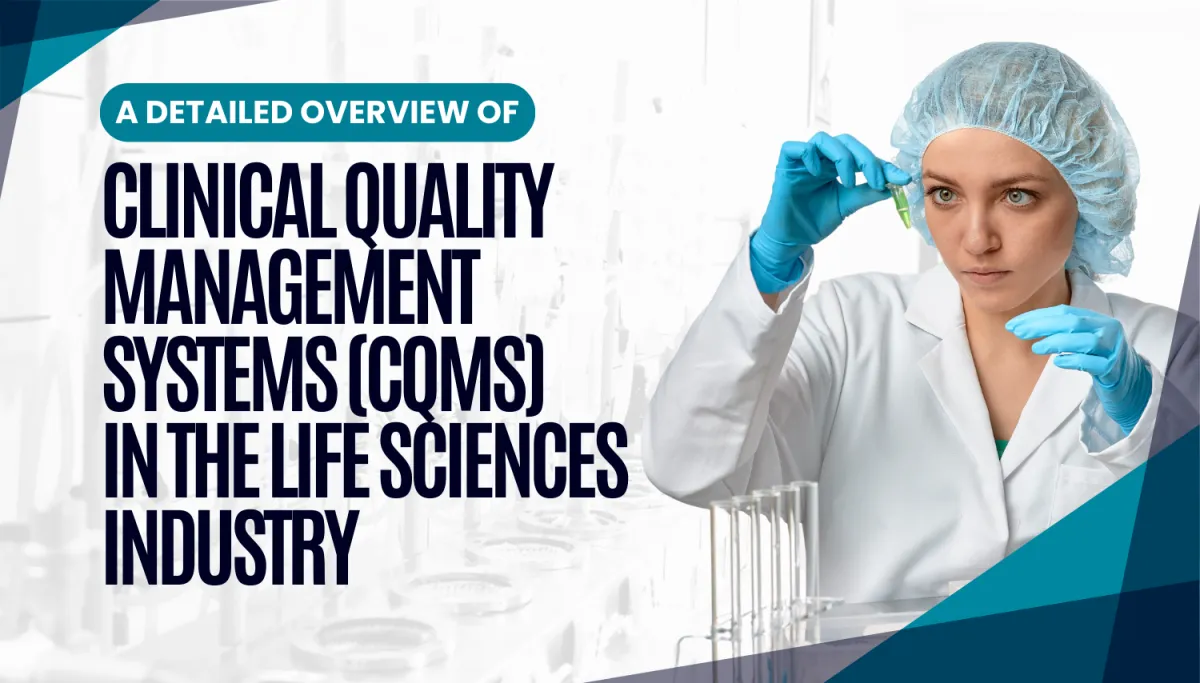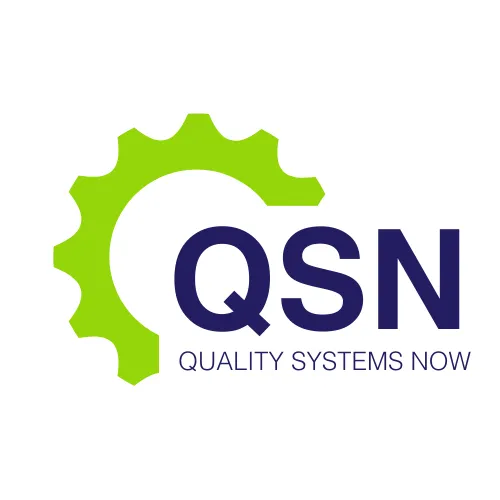LATEST NEWS

A Detailed Overview of Clinical Quality Management Systems (CQMS) in the Life Sciences Industry
Introduction
A Clinical Quality Management System (CQMS) plays a vital role in ensuring the safety, integrity, and success of clinical trials within the life sciences industry. With strict regulatory requirements imposed by global authorities such as the U.S. Food and Drug Administration (FDA) and the European Medicines Agency (EMA), organizations must adopt structured and efficient quality management systems to meet these expectations. Central to a CQMS are components like Standard Operating Procedures (SOPs), risk-based quality management, document control, and continuous improvement processes, all of which are critical for maintaining regulatory compliance and ensuring the reliability of clinical trial data.
The need for a CQMS has become even more pronounced with the introduction of updated guidelines, such as the ICH E6(R2), which emphasizes quality by design and proactive risk management throughout the clinical trial lifecycle. By implementing a robust CQMS, organizations can ensure that their trials adhere to Good Clinical Practice (GCP), protect the rights and safety of participants, and deliver trustworthy outcomes that advance medical research.
1. The Framework of Clinical Quality Management Systems
A Clinical Quality Management System (CQMS) encompasses the policies, processes, and procedures that an organization uses to ensure that its clinical trials meet quality standards and regulatory requirements. Central to any CQMS is the need for ensuring that all phases of clinical research, from study design to data reporting, are conducted in a manner that guarantees the protection of human subjects and the integrity of trial data.
The framework of a CQMS is built around several core components:
Standard Operating Procedures (SOPs): These are written instructions detailing the processes for conducting clinical trials. SOPs ensure consistency, reproducibility, and adherence to regulatory expectations.
Risk-Based Approach: A CQMS incorporates risk-based quality management to assess and mitigate risks associated with clinical trial activities. This methodology allows for prioritizing resources to areas with the highest potential impact on trial outcomes.
Document Control: Maintaining accurate, up-to-date, and accessible documentation is critical. Document control systems are designed to track changes, version histories, and the approval process for trial-related documents.
Training and Competency Assessment: Personnel involved in clinical trials must be adequately trained and competent. A CQMS ensures that ongoing education and assessments are in place to maintain high standards.
2. Regulatory Requirements and CQMS
The clinical research sector is subject to stringent regulatory oversight, with organizations such as the U.S. Food and Drug Administration (FDA) and the European Medicines Agency (EMA) providing detailed guidelines on quality management in clinical trials. Central to these guidelines is adherence to Good Clinical Practice (GCP), a set of internationally recognized ethical and scientific quality standards for conducting clinical trials.
GCP emphasizes the need for:
Data Integrity: Clinical trial data must be accurate, complete, and verifiable. This is achieved through rigorous data management practices, including audit trails, secure storage, and systematic validation processes.
Subject Safety and Ethical Considerations: Protecting the rights, safety, and well-being of trial participants is paramount. CQMS frameworks integrate ethical safeguards, including Institutional Review Board (IRB) approvals and informed consent processes.
Regulatory Submissions and Inspections: Organizations must be prepared to submit documentation to regulatory agencies and undergo inspections. A robust CQMS ensures that trial data, protocols, and results are readily available for review, supporting compliance and transparency.
In 2016, the International Council for Harmonisation (ICH) released E6(R2), an addendum to its GCP guidelines that emphasizes the role of quality management systems in clinical trials. This addendum introduced the concept of quality by design, highlighting the need for proactive quality planning throughout the clinical trial lifecycle, rather than relying solely on retrospective quality control measures.
3. Quality Risk Management (QRM)
One of the most critical elements of a CQMS is the incorporation of a quality risk management (QRM) process. QRM ensures that organizations are able to identify, assess, and manage risks that could negatively impact the quality of clinical trials. The QRM process involves:
Risk Identification: Understanding the potential risks that could arise in various aspects of clinical trial operations, from data collection and patient recruitment to adverse event reporting.
Risk Assessment: Evaluating the likelihood and potential impact of these risks, allowing organizations to prioritize areas requiring greater oversight or preventive measures.
Risk Control: Implementing control measures to mitigate identified risks. This may include enhanced monitoring, adjusting trial protocols, or introducing additional training for personnel.
Risk Communication: Sharing information about risks and mitigation strategies with stakeholders, including investigators, sponsors, and regulatory authorities.
Risk Review: Continuously evaluating the effectiveness of risk management strategies and making adjustments as needed.
The QRM process helps ensure that resources are allocated efficiently, focusing on the most critical areas that affect the quality and safety of the trial. This proactive approach aligns with the principles of continuous improvement, which are fundamental to maintaining a high-functioning CQMS.
4. Document Control and Data Integrity
Effective document control is essential to any quality management system, particularly in the clinical research setting where documentation is critical to regulatory compliance and data integrity. A CQMS employs a comprehensive document control system to manage the creation, approval, distribution, and archiving of essential documents, including trial protocols, investigator brochures, informed consent forms, and case report forms (CRFs).
Furthermore, data integrity is a core focus of CQMS, ensuring that data collected during clinical trials is complete, consistent, and accurate throughout its lifecycle. To this end, systems must be in place to protect data from unauthorized access, tampering, or accidental loss. Electronic data capture (EDC) systems, along with stringent security measures and audit trails, are commonly used within CQMS frameworks to uphold data integrity standards.
5. Continuous Improvement in CQMS
The concept of continuous improvement is a fundamental principle within any quality management system. CQMS promotes the ongoing review and refinement of clinical trial processes to ensure that best practices are followed, risks are minimized, and opportunities for enhancing trial quality are seized.
Continuous improvement within CQMS can be facilitated by:
Audits and Inspections: Regular internal audits, as well as external inspections by regulatory agencies, provide feedback on the performance of the quality management system. These reviews identify gaps and areas for enhancement, prompting corrective and preventive actions (CAPA).
Feedback Mechanisms: Input from investigators, sponsors, patients, and other stakeholders can offer valuable insights into the trial’s operation and areas that may benefit from refinement.
Technology and Innovation: Advances in clinical trial technology, such as electronic trial master files (eTMF) and remote monitoring, are continually integrated into CQMS to streamline processes and improve efficiency.
At Quality Systems Now we provide a range of Services supporting your efforts.
A well-implemented Clinical Quality Management System is essential for ensuring the integrity, safety, and success of clinical trials. By integrating rigorous documentation practices, a risk-based approach, and a commitment to continuous improvement, CQMS frameworks provide the foundation for high-quality clinical research. Regulatory requirements such as GCP and ICH E6(R2) underscore the importance of maintaining robust quality management systems in the life sciences industry. Organizations that adopt a proactive, comprehensive approach to CQMS are better positioned to meet regulatory expectations, protect trial participants, and deliver reliable, reproducible clinical data.
